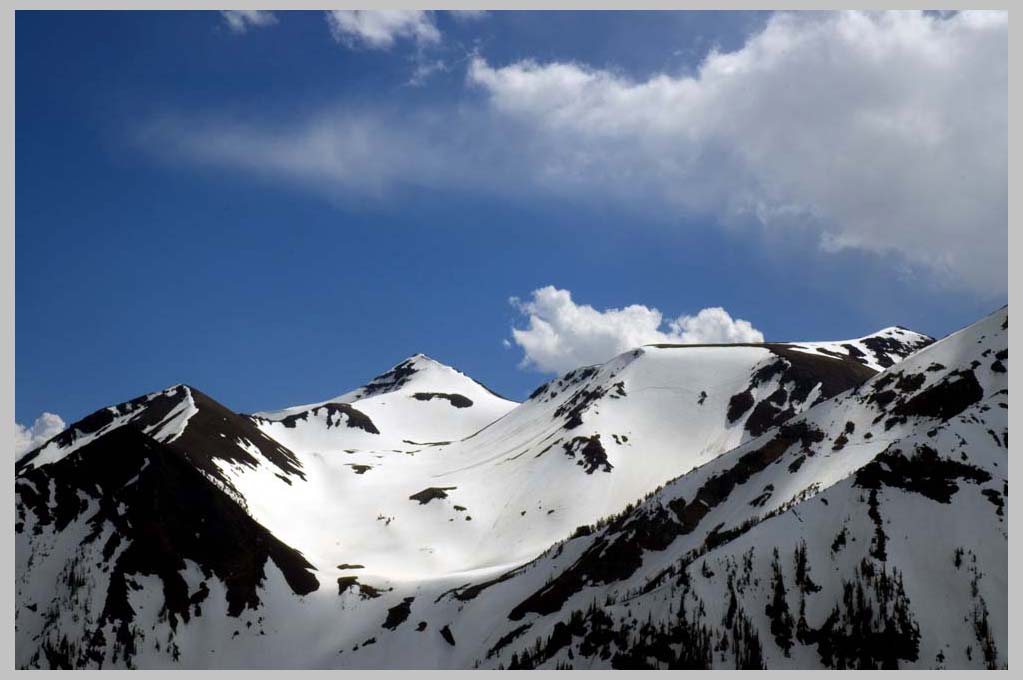

HURRICANE VALLEY, from Dug Peak (VI.1.2009), just east of Twin Peaks, [ click photo for next . . . ]
Forms. Ridgelines. Clouds. Eagle Cap Wilderness . . .


HURRICANE VALLEY, from Dug Peak (VI.1.2009), just east of Twin Peaks, [ click photo for next . . . ]
Forms. Ridgelines. Clouds. Eagle Cap Wilderness . . .
Chance proposes; Intelligence disposes.
No one can predict which flower the butterfly
will pass by next.
ON THE ILLUSION OF INDEPENDENCE
(i)
The further we go into the unknown of the wilds, the more we become
aware, not, as one might think, of how free, or how self sufficient, we
are. It soon becomes clear that each of us is nested within a web, a web
of human mutual dependencies. We are indeed not just as Aristotle
would have us believe, a political animal, but rather I would argue a
thoroughly social one. The difference is that the political aspect of our
nature deals more with power, decision making and the just distribu-
tion of resources, whereas our social aspect deals more with relation-
ships of mutual dependence and mutual benefit. The latter, it seems to
me, is by far the more primary.
For it is a strange thought, is it not? “I don’t need anybody!” It comes,
some say, with money, especially an excess of money. Money, as we
all know can “grow” in an abstract way without limit. This gives us
the comforting illusion of a natural world which also can grow with-
out limit: giant trees that we can cut down forever; oil wells and clear
springs that flow on into eternity. Money also conjures up for us a
powerful and absolute idea of independence. What I need, I buy. At
the neighborhood store, there’s an endless supply of apples and cof-
fee cans. I buy one, and somehow, magically, the next time I’m there,
another has materialized to take its place. And so on, and so on, we
naturally assume, without end. These are the two prime and unavoid-
able confusions or contradictions inherent in the idea of money as we
now know it.
We might ask the great explorers who went to the Poles 100 years ago.
Or those intrepid men who went to the Moon and back just forty years
past. Once those amazing expeditions were ‘out there,’ so to speak, they
became necessarily proud exemplars of independence and self-suffi-
ciency. Yet it was this extreme isolation itself that brought into intensely
sharp focus both the limits of such isolation, and the delicate yet mov-
ingly beautiful reality of this human web of mutual dependence.
Alone in the physical, earth-bound realm, we are nothing. Remark-
ably, this is what we grow aware of the further out we go, and the more
surrounded by that nothingness we become. And when we are lucky
enough to return, we are indeed changed human beings.
(ii)
Always take three of any essential necessity when packing out into the
unknown: one, for the soothing illusion of independence; two, for the
pride of the self-sufficient; three, for the happy fact of the illusion of
independence as you, with luck, find your way back home.
THE LITTLE CLAVIER please preview 150 of 631 pages
w/ my black & white photography [opens in new window]
Let me know how you like it!
If you're a picture-poems fan, please visit my Living Water
Gallery—the best of my flowform photography w/ a selection
of quality prints & frames . . .
[ mouse over for controls / lower right fro full-screen ]

All Photographs & texts by Cliff Crego © 2011 picture-poems.com
(created: X.11.2008)